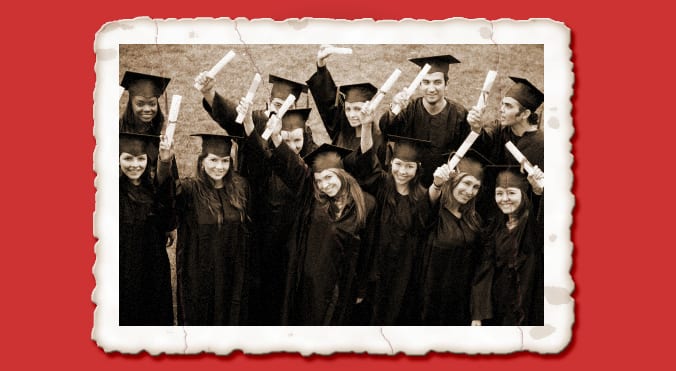 College reunions are designed to trigger reflection, nostalgia and insights into the winding, baffling life journey that connects who you were at 20 and who you are now. And maybe, for cynics, how much you owe your college, how impressive are your life achievements, and how good you look compared to your college boyfriend’s wife.
College reunions are designed to trigger reflection, nostalgia and insights into the winding, baffling life journey that connects who you were at 20 and who you are now. And maybe, for cynics, how much you owe your college, how impressive are your life achievements, and how good you look compared to your college boyfriend’s wife.
I recently spent five days at my 25th college reunion. To explain the experience, I need to identify the school. Harvard. Not to brag. It’s just I’m not sure my reactions would make sense if I’d gone to any other school. It’s the kind of place that, even when I say the word in my head, it comes out in all caps: HARVARD!
Going to my reunion felt like four years of college condensed into a Thursday through Sunday in late May.
First, the dread beforehand. I wanted to go to the 25th reunion, to experience the milestone. I felt honored that I could go – that I earned a degree from an internationally prestigious college.
However, part of me desperately wanted to stay home.
Exactly the way I felt at 18 when Harvard accepted my application and the world made clear I would be a fool not to attend. I knew I’d thrive more at a smaller, less impressive school where I could shine and receive more individual attention. I went with the world’s decision.
Then came the sheer intimidation of being at Harvard again. Stunningly terrifying. As soon as I set foot on campus, I felt like a six-year-old rather than a 46-year-old. It was primal. I had been transported back in time.
And, oh what a different time it was. Back in the days before helicopter parents, before high schools held “separation” meetings for senior parents and colleges were forced to set a deadline for freshman parents to leave campus. Back in September 1983, my mother drove me north in our old station wagon and dropped me at my new dorm. She stayed for 45 minutes, max, looking around my shabby L-shaped room as if she was certainly glad she wasn’t going to spend the next year staring at those four hospital-green walls.
What makes her quick departure even more astonishing is what a psychological jellyfish I was. I had developed anorexia my senior year – it seemed a logical reaction to my terror of growing up and guilt at abandoning my younger siblings to our dysfunctional home. When my mother dropped me off at Harvard, I weighed 97 pounds (which, for comparison, is 60 pounds fewer than today). I was also grappling with the disintegration of my nuclear family (my parents had been miserable for years and would separate soon) and the undeniable rampage of alcoholism and drug abuse that had torn through my family (myself included) for generations.
In my mother’s defense, I believe she trusted I would right myself once at college. I also believe, perhaps delusionally, that she knew herself to be the last person on earth who could help me recover from all of these problems. She intentionally left me, knowing abandonment was the best thing for me! Trust me, I would have told you, even then, that though she loved me dearly, she was more challenge than solution, and I would start recovering the minute I was on my own in Cambridge.
Which I did. I joined a self-help group and found a therapist by myself. I began the process of gaining 40 pounds and untangling how I’d gotten to be such a mess anyway. However, the whole shebang was overwhelming, intensely introspective and embarrassing. I hardly managed to say “hi” to my classmates, roommates, or professors for the entirety of my freshman year.
This didn’t leave much opportunity for making friends, comping the Crimson, taking up intermural soccer or reading Shakespeare plays.
Yet I loved Harvard and the fact that everyone – my fellow students, my dorm proctor, my professors, my family – gave me space to find my new self and recover my equilibrium. The remaining three years were filled with fascinating courses, new friends, late nights, pranks and proud moments. Since graduation, I’ve had a string of good jobs (the first being a Seventeen Magazine article about my recovery from anorexia), a few other Harvard-worthy accomplishments, a happy marriage, and three healthy children.
Which is why I was so utterly astonished to lose every shred of my identity once I stepped back into ivy-covered Harvard Yard.
I was terrified. I knew no one! (It didn’t help that 25 years dramatically transform some people’s appearances.)
No one liked me! No one remembered me! What was I doing there?
I WAS the “mistake” Harvard admissions had let slip past!
When was the next flight back to DC?
 I’m happy to report that by Friday night, which I’d equate approximately to junior year, I found my old friends and my old self and began to have a blast. The highlight was the Saturday night talent show. It was held in Sanders Theater, an ancient wood ampitheater where I took my favorite philosophy class. The show was MC-ed by a famous NPR comedian (from my class) and featured performances by a world famous harpist (my class), a world famous guitar player (my class), and movie clips from several world famous writers, actresses, artists and directors (all from my class).
I’m happy to report that by Friday night, which I’d equate approximately to junior year, I found my old friends and my old self and began to have a blast. The highlight was the Saturday night talent show. It was held in Sanders Theater, an ancient wood ampitheater where I took my favorite philosophy class. The show was MC-ed by a famous NPR comedian (from my class) and featured performances by a world famous harpist (my class), a world famous guitar player (my class), and movie clips from several world famous writers, actresses, artists and directors (all from my class).
Probably because I only knew 10 people from the Class of 87, I had never realized I had such rock star classmates.
The best part was that I didn’t begrudge them their excellence. The 25th reunion glow settled over me as I nestled between the few friends who had known me for almost 30 years, who didn’t care that I had once been a 97-pound near-mute freshman freak. I was happy for my intimidatingly successful peers. And for myself, with my wholly different brand of success.
Self-acceptance: that is what college reunions, at their best, are really about.





